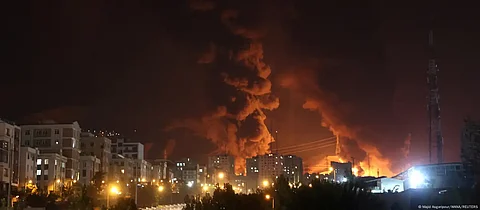

Israel and Iran launched renewed strikes on each other overnight into Sunday, heightening concerns of a broader regional conflict after Israel escalated its surprise campaign with an attack on the world’s largest gas field.
Tehran cancelled nuclear talks that Washington had described as the only path to halting Israel’s bombardment, while Israeli Prime Minister Benjamin Netanyahu warned that the latest strikes were “nothing” compared to what Iran would face in the coming days.
The latest wave of Iranian attacks began shortly before midnight on Saturday when air raid sirens rang out in Jerusalem and Haifa, sending around one million people into bomb shelters.
At approximately 2:30 a.m. on Sunday, the Israeli military issued another alert of an incoming missile barrage and urged residents to seek shelter. Explosions echoed across Tel Aviv and Jerusalem as interceptor rockets lit up the night skies. The shelter-in-place advisory was lifted nearly an hour later.
Emergency services reported at least seven people killed overnight, more than 140 others were injured in the attacks. Israeli media reported that at least 35 people were missing following a strike in Bat Yam, a city south of Tel Aviv. A missile hit an eight-storey building, and while many residents were rescued, fatalities were confirmed. It remains unclear how many buildings were hit during the night.
Since Iran began its retaliatory strikes on Friday, at least nine people in Israel have been killed and over 300 wounded.
In Iran, authorities have said 78 people were killed on the first day of Israel’s campaign, with dozens more perishing on the second. Among them were 60 people — including 29 children — who died when a missile brought down a 14-storey apartment block in Tehran.
Iran reported that the Shahran oil depot in Tehran was struck by Israel but said the situation was under control. A fire also broke out at a nearby oil refinery, while Israeli missiles reportedly targeted a defence ministry building, causing minor damage, according to semi-official news agency Tasnim.
In the first known attack on Iran’s energy infrastructure, Israel struck the South Pars gas field — the world’s largest — prompting a partial shutdown, Tasnim reported. Located offshore in Iran’s southern Bushehr province, South Pars is the source of most of the country’s natural gas production.
Fears of disruption to regional oil exports had already pushed crude prices up by 9% on Friday, even though Iran’s oil and gas infrastructure had been spared on the first day of Israeli attacks.
Iranian General Esmail Kosari said on Saturday that Tehran was reviewing whether to close the Strait of Hormuz, the crucial waterway through which a significant portion of the world’s oil passes.
A planned round of US-Iran nuclear talks due to take place in Oman on Sunday was cancelled. Iranian Foreign Minister Abbas Araqchi said negotiations could not proceed while Iran was being subjected to what he described as Israel’s “barbarous” attacks.
Donald Trump warned Iran of further escalation but suggested there was still time to halt the Israeli offensive if Tehran agreed to significant curbs on its nuclear programme.
Israel maintains that Iran’s nuclear activities pose an existential threat and said the campaign was intended to stop Tehran from taking the final steps towards developing a nuclear weapon.
Tehran insists its nuclear programme is entirely civilian in nature and that it does not seek to build an atomic bomb. However, the UN nuclear watchdog reported this week that Iran was in breach of its commitments under the global non-proliferation treaty.
As Israel warned that its military operation could continue for weeks, Prime Minister Netanyahu urged the Iranian people to rise up against their clerical rulers. Fears are mounting of a wider regional war involving outside powers.
Iran has warned Israel’s allies that their military bases in the region would also be targeted if they assisted in intercepting Iranian missiles.
Nevertheless, Tehran’s capacity to retaliate may be limited. Twenty months of war in Gaza and a conflict in Lebanon last year have severely weakened Iran’s main regional proxies — Hamas and Hezbollah.
The prominent Israeli human rights organisation B’Tselem said on Saturday that instead of exhausting all diplomatic avenues, Israel’s government had opted for war — endangering the entire region.